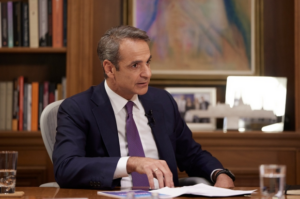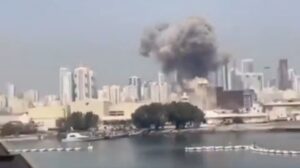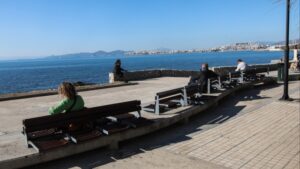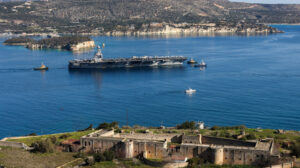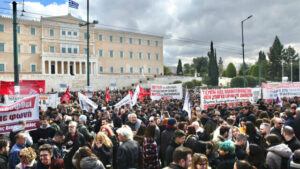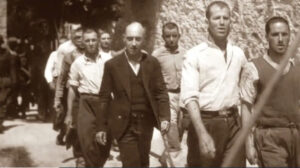For the first time since the Turkish invasion of 1974, the leaders of Greece and Turkey found themselves so close to Cyprus yesterday. In reality, they did not even meet, neither physically nor in terms of political positions.
Despite a statement from the Turkish Ministry of Defense threatening with the verse, “I may come suddenly one night,” Erdogan left before nightfall and before Kyriakos Mitsotakis reached free Nicosia.
It was also the first time a Greek Prime Minister visited Cyprus and spoke at the main anti-occupation event commemorating the anniversary of the Turkish invasion. For the first time, the leaders of the two largest opposition parties (S. Kasselakis and N. Androulakis) were also present at the same event simultaneously.
With only a few hours’ difference, Mitsotakis and Erdogan confirmed in their speeches yesterday the distance separating Athens and Ankara on the Cyprus issue. However, one cannot overlook a significant difference: Athens supports the choices of Nicosia, while Ankara imposes its positions on the Turkish-Cypriots.
On one hand, the Greek side proclaimed the stability of its quest for a solution within the framework of UN resolutions and decisions, with an enhanced role for the EU. On the other hand, the Turkish side demanded that international law submits to the illegal “realities” created by 50 years of military occupation, outside the agreed framework supported by the international community.
Two Worlds
While the UN Secretary-General’s initiative is underway, with his personal envoy’s contacts aimed at finding common ground to restart the negotiation process that was stopped by the Turkish side at Crans-Montana in Switzerland in July 2017, the gap remains deep. This gap was created by the Turkey’s change of course, abandoning the agreed framework of seeking a solution for a bi-zonal, bi-communal federation, demanding a two-state solution and preemptive recognition of sovereign equality for the pseudo-state.
Erdogan arrived in occupied Nicosia as a warlord, accompanied by fighter jets, 50 warships, paratroopers, and an acrobatic display team.
Mitsotakis chose to be accompanied by his wife, the Foreign Minister, the government spokesman, and service officials.
In the pseudo-state, as every year, an Ottoman-style celebration was set up with military parades and honors rendered to the mujahideen (sic) (Turkish Cypriot fighters) and the mehmetçik (Turkish soldiers). Every event reiterated, tiresomely, that in 1974 a “peace operation” took place to liberate the Turkish Cypriots from “Greek bonds”, with the right given to Turkey by the 1960 Constitution, which made it one of the three guarantor powers.
In the free areas, there were memorials services, unveilings of busts of the fallen and tears. Tears for the people who were lost, for the missing who are still being sought, and for the land that was trampled by the Turkish conquerors.
When darkness fell, the events concluded with a dignified tribute to those who sacrificed themselves and a reminder that “we do not forget” is not just another slogan that has faded after 50 years.
We Negotiate, We Do Not Retreat
In his speech at the gardens of the Presidential Palace in Nicosia, the Prime Minister made it clear to Ankara that the persistence of the Greek side for the resumption of talks is not a sign of weakness, nor does it indicate a willingness to retreat.
Mr. Mitsotakis said that Athens and Nicosia have a clear position: “We do not accept faits accomplis. Our pursuit remains one: a Cyprus Republic with one sovereignty, one international personality, and one citizenship, in a bi-zonal, bi-communal federation, in a unified state where all citizens will be both Cypriot and European without a foreign occupation army, without outdated guarantees, as precisely outlined by the UN resolutions and respect for the European acquis.”
He acknowledged that in the past, Athens and Nicosia were not always on the same wavelength regarding handling the issue, but now, “the two national poles are more united than ever. Something that must be admitted, has not always been a stable given in the common struggle.”
He pointed out the dangers of stagnation, saying that “Athens and Nicosia reject the bankrupt doctrine that immobility produces movement. Nor do we accept the fatalistic observation that each new year will be the same or worse than the previous one.”
Responding to those who believe that Greek-Turkish rapprochement cannot exist due to the Cyprus issue, K. Mitsotakis argued that Greek-Turkish rapprochement also helps in the progress of the Cyprus issue, and addressing Ankara, he clarified that “the fact that we are talking does not mean we agree and even more so that we retreat. On the contrary, I would say. Greece now talks with everyone as a state strong in all fields, economically, politically, militarily, diplomatically (…) After all, only those who are wrong, only those who have no arguments avoid dialogue, especially when provocations further burden the atmosphere.”
Cypriot President Nicos Christodoulides, in his own speech, echoed the same sentiment, stating that the Greek Cypriot side is ready to engage in substantive negotiations to achieve a viable and functional solution, making it clear, however, that no one should expect cooperation in a false and stillborn settlement equivalent to two states or one that cannot function or allow all citizens of the Cyprus Republic to enjoy basic human rights. He noted that non-solution is not a solution and the status quo creates dangers and works in favor of the occupier. As long as there is occupation, N. Christodoulides noted, “as long as there is no solution, we are all losers, Greek Cypriots and Turkish Cypriots alike.”
The Cypriot President said, “despite the difficulties, problems, disappointments, challenges, and occasional threats, like those we heard today from the leader of occupying Turkey, we do not compromise with occupation. With assertive realism, determination, persistence, without lamenting, without introversion, without defeatism, without lamenting, we continue the effort in an ever-changing international reality.”
Verbal Threats and Menaces
Earlier in occupied Nicosia, the Turks had not received the messages sent by the leaders of foreign states and EU institutions, such as Ursula von der Leyen and Roberta Metsola. Messages condemning the invasion and the 50-year occupation of Cypriot, and since 2004, EU territory.
Tayyip Erdogan showed no willingness for understanding, insisting that the effort to find a federal solution is “dead” and the only “solution” is partition. However, partition must, in his view, ensure Turkish Cypriot participation in the EU.
Wanting to lend a semblance of legitimacy to the pseudo-state, Erdogan argued that the intellectual father of the two-state solution proposal is Turkish Cypriot leader Ersin Tatar. Tatar’s proposals, he said, are very valuable, and “the Greek Cypriot and Turkish Cypriot sides must sit at the negotiation table as equals on every level. That’s why we say if you want a solution, recognize the inherent rights of the Turkish Cypriots. I hope we will see the days when the leaders of the guarantor countries of the island (Greece – Turkey – Britain) will visit both states together. I said this to the Greek Prime Minister Mitsotakis himself when I met him in Washington at the NATO summit.”
Erdogan attacked Kyriakos Mitsotakis through Nikos Dendias, saying: “Recently, the Greek Defense Minister made unreasonable statements. We recently met with Mr. Mitsotakis and I told him: ‘We will be in Northern Cyprus on July 20, and you will be in the South; I assume you will not disturb us from there.’ He said he would not. Extremely irresponsible steps are being taken. You can’t bathe twice in the same water,” he claimed.
Referring to the Greek-Turkish dialogue, Tayyip Erdogan argued that “it will undoubtedly contribute to the solution of the Cyprus issue.” He emphasized the property issue, as the Cyprus Republic has recently issued warrants and arrests foreigners participating in illegal sales of Greek Cypriot land in the occupied areas. “Here I must stress very clearly,” Erdogan said, “the process to resolve the property issue on the island is the Immovable Property Commission, which is an effective internal legal remedy body internationally.” The Immovable Property Commission was established following a decision by the European Court of Human Rights but has proven ineffective, as the compensations offered to Greek Cypriots for selling or exchanging land are laughable.
Regarding the arrest warrants, he said, “those who resort to other means and think they will achieve their goals by pressuring the Turkish Cypriots are making a big mistake. Neither will we allow faits accomplis, nor will the Turkish Cypriot people succumb to threats. We cannot ignore the Turkish Cypriots, the ancient and essential element of the island. We continue our efforts with determination for the recognition of the TRNC (pseudo-state) and the implementation of the two-state solution.”
Furthermore, Erdogan reiterated the usual positions on the supposed necessity of defending the Turkish Cypriots, which led to the “peace operation” of 1974, speaking of massacres committed by Greek Cypriots from 1963 to 1974.
The Turkish Cypriot leader Ersin Tatar, in his speech, did not shy away from rambling about the history of Cyprus, as he has “written” it. Tatar claimed that the pseudo-state and Turkish Cypriots will eventually take their “rightful” place in the world and achieve their goals.
He also referred to the rounds of negotiations from 1974 to 2017, saying they failed due to the Greek side’s stance.
“The Greek side,” he said, “continues to insist on a solution in which Turkish Cypriots would be a minority in a federation that would function as a unitary state within the EU.”
Tatar stated that the Turkish Cypriots would never accept this solution, which would involve relinquishing their “state and sovereignty” while simultaneously renouncing Turkey’s guarantees, the presence of Turkish troops in Cyprus, and intervention rights.
Message from Brussels
Yesterday, the President of the European Commission, Ursula von der Leyen, posted a message of support for the Republic of Cyprus on X, writing: “Today, on this tragic 50th anniversary, and every day, we stand with Cyprus. We support its territorial integrity and sovereignty. The Cypriots deserve to live in a reunified country in conditions of peace, coexistence, stability, and prosperity. The Cyprus issue is also a European issue. We will continue to steadfastly support Cyprus in its efforts to reunify the last divided EU member state, in accordance with the relevant UN Security Council resolutions.”
Statements condemning the Turkish invasion and the ongoing occupation of Cyprus were also made by the President of the European Parliament, Roberta Metsola, as well as by European political parties.
Support for the Turkish side was only recorded from Azerbaijan, which also sent a delegation to the parade in the occupied territories. However, Baku has not recognized the pseudo-state, while it does recognize the Republic of Cyprus.
Ask me anything
Explore related questions
